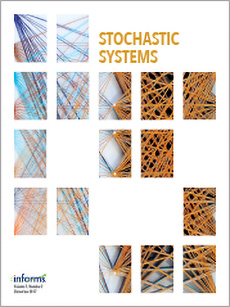Abstract
We consider a queueing system with $J$ parallel servers $\mathcal{S} =\{m_{1},\ldots,m_{J}\}$, and with customer types $\mathcal{C} =\{a,b,\ldots\}$. A bipartite graph $G$ describes which pairs of server-customer types are compatible. We consider FCFS-ALIS policy: A server always picks the first, longest waiting compatible customer, and a customer is always assigned to the longest idle compatible server. We assume Poisson arrivals and server dependent exponential service times. We derive an explicit product-form expression for the stationary distribution of this system when service capacity is sufficient. We also calculate fluid limits of the system under overload, to show that local steady state exists. We distinguish the case of complete resource pooling when all the customers are served at the same rate by the pooled servers, and the case when the system has a unique decomposition into subsets of customer types, each of which is served at its own rate by a pooled subset of the servers. Finally, we discuss possible behavior of the system with generally distributed abandonments, under many server scaling. This paper complements and extends previous results of Kaplan, Caldentey and Weiss [18], and of Whitt and Talreja [34], as well as previous results of the authors [4, 35] on this topic.
Citation
Ivo Adan. Gideon Weiss. "A skill based parallel service system under FCFS-ALIS — steady state, overloads, and abandonments." Stoch. Syst. 4 (1) 250 - 299, 2014. https://doi.org/10.1214/13-SSY117
Information





